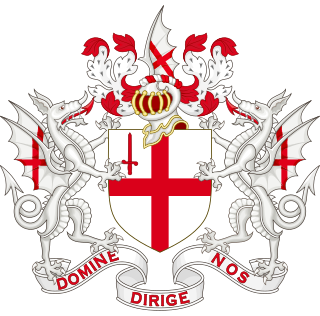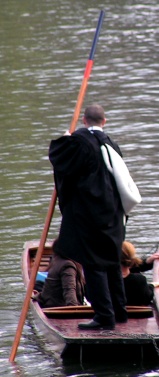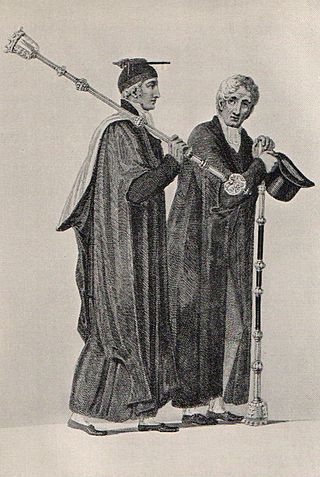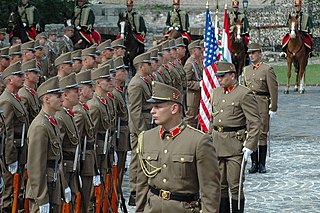
A ceremonial mace is a highly ornamented staff of metal or wood, carried before a sovereign or other high officials in civic ceremonies by a mace-bearer, intended to represent the official's authority. The mace, as used today, derives from the original mace used as a weapon. Processions often feature maces, as on parliamentary or formal academic occasions.
A serjeant-at-arms or sergeant-at-arms is an officer appointed by a deliberative body, usually a legislature, to keep order during its meetings. The word "serjeant" is derived from the Latin serviens, which means "servant". Historically, serjeants-at-arms were armed men retained by English lords and monarchs, and the ceremonial maces which they are associated with were originally a type of weapon.

The City of London Corporation, officially and legally the Mayor and Commonalty and Citizens of the City of London, is the local authority of the City of London, the historic centre of London and the location of much of the United Kingdom's financial sector.

A verger is a person, usually a layperson, who assists in the ordering of religious services, particularly in Anglican churches.

The University of Cambridge has a long tradition of academic dress, which it traditionally refers to as academical dress. Almost every degree which is awarded by the University has its own distinct gown in addition to having its own hood. Undergraduates wear college gowns, which are all subtly different; these differences enable the wearer's college to be determined. Academic dress is worn quite often in Cambridge on formal, and sometimes informal, occasions, and there are a number of rules and customs governing when and how it is worn. Black gowns (undress) are worn at less formal events, while on special occasions full academical dress is worn, consisting of gown, hood and headdress with Doctors in festal dress. The University's officials also have ancient forms of academic dress, unique to the University.

The bedel was, and is to some extent still, an administrative official at universities in several European countries, and often had a policiary function at the time when universities had their own jurisdiction over students.
A congregation can refer to "an assembly of senior members of a university". It is used in this general sense in both of the ancient universities of England, although with significant differences. At Cambridge, and at many other universities in England and around the world, it particularly refers to such assemblies when held as graduation ceremonies, while at Oxford it is the governing body of the university.

Public duties are performed by military personnel, and usually have a ceremonial or historic significance rather than an overtly operational role.
A chancellor is a leader of a college or university, usually either the executive or ceremonial head of the university or of a university campus within a university system.

A mace-bearer, or macebearer, is a person who carries a mace, either a real weapon or ceremonial.

An Esquire Bedell is a junior ceremonial officer of a university, usually with official duties relating to the conduct of ceremonies for the conferment of degrees. The word is closely related to the archaic bedel and modern English beadle.

A guard of honour, honor guard or ceremonial guard, is a group of people, typically drawn from the military, appointed to perform ceremonial duties – for example, to receive or guard a head of state or other dignitaries, the fallen in war, or to attend at state ceremonials, especially funerals. In military weddings, especially those of commissioned officers, a guard, composed usually of service members of the same branch, form the sabre arch. In principle, any military unit could act as a guard of honour. In some countries, certain units are specially assigned to undertake guard of honour postings or other public duties. Republican guards, royal guards and foot guards frequently have ceremonial duties assigned to them.

The Court of Common Council is the primary decision-making body of the City of London Corporation. It meets nine times per year. Most of its work is carried out by committees. Elections are held at least every four years. It is largely composed of independent members although the number of Labour Party Common Councilmen in 2017 grew to five out of a total of 100. In October 2018, the Labour Party gained its sixth seat on the Common Council with a by-election victory in Castle Baynard ward. The most recent election was in 2022.
A wardmote was a meeting of the inhabitants of a ward, or a court held in the ward, to try defaults in matters relating to the watch, police, and the like.

The Serjeant at Arms of the House of Commons is a parliamentary official responsible for order in the House of Commons of the United Kingdom. The office dates to 1415 and traditionally included responsibility for security. The role is now mainly ceremonial.

The City of London is divided into 25 wards. The city is the historic core of the much wider metropolis of Greater London, with an ancient and sui generis form of local government, which avoided the many local government reforms elsewhere in the country in the 19th and 20th centuries. Unlike other modern English local authorities, the City of London Corporation has two council bodies: the now largely ceremonial Court of Aldermen, and the Court of Common Council.
The procedures and traditions surrounding academic graduation ceremonies differ around the world.

Ceremonial maces in the United Kingdom began as lethal weapons of medieval knights in England, Scotland, and Wales, evolving into ceremonial objects carried by sergeants-at-arms.
The Duke of Edinburgh's Royal Regiment Band was a military band of the British Army that served as the regimental band of the Duke of Edinburgh's Royal Regiment from 1959 to 1994. During its existence, the regimental band maintained a corps of drums alongside its band that took part in many different ceremonies on behalf of the regiment.


















